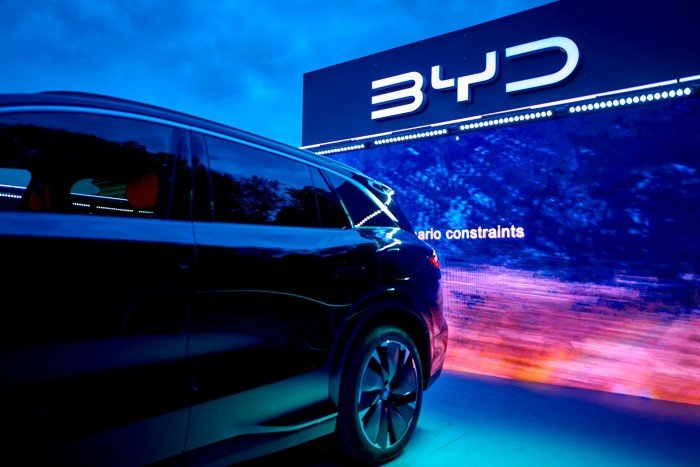UK becomes BYD’s largest international market after sales surge
Stay informed with free updates Simply sign up to the Electric vehicles myFT Digest — delivered directly to your inbox. The UK has become BYD’s biggest market outside of China after sales increased nearly 10-fold in September, despite the world’s largest electric-vehicle manufacturer being excluded from the government’s new subsidy scheme. BYD said on Monday…
Stay informed with free updates
Simply sign up to the Electric vehicles myFT Digest — delivered directly to your inbox.
The UK has become BYD’s biggest market outside of China after sales increased nearly 10-fold in September, despite the world’s largest electric-vehicle manufacturer being excluded from the government’s new subsidy scheme.
BYD said on Monday that it sold a record 11,271 vehicles in the UK last month, compared with 1,150 in the same month last year. The Chinese carmaker, which undercuts most of its rivals on price, saw its market share jump to 3.6 per cent in September, putting it in second place behind Tesla in terms of EV sales.
The UK government in July announced a £650mn grant designed to boost the sales of electric vehicles, but excluded cars made in China because of the emissions produced in the manufacturing process.
BYD previously told the Financial Times that the scheme was “stupid”, saying the discounts would work like a “drug” that would hurt the UK market in the long term.
Still, the discounts, which reach up to £3,750 per vehicle, helped to boost total EV sales in the UK to a monthly record in September.
Battery-powered vehicles account for 22 per cent of new car registrations in the UK so far in 2025 after sales increased 29 per cent to 72,779 in September, according to the Society of Motor Manufacturers and Traders. But that was still below the 28 per cent required this year under the government’s EV mandate.
Ministers explicitly designed the subsidy scheme to try to help local carmakers take on Chinese rivals, which can produce cheaper vehicles and undercut them on price.
However, Britain’s major manufacturers continue to struggle. Nissan, which owns the largest UK plant, is downsizing its global operations because of financial difficulties, while Jaguar Land Rover’s production has ground to a halt in the wake of a hugely disruptive cyber attack that has resulted in the government agreeing to provide a loan guarantee worth up to £1.5bn.
Meanwhile BMW has delayed plans to invest £600mn in its Mini plant in Oxford to reintroduce electric models, and has laid off some workers from the site.
The rapid growth of BYD in the UK and Europe comes as demand in its home market of China has slowed, with sales in September falling for the first time in 19 months.
Chinese state-owned group Chery, which produces EVs and hybrids under the Omoda and Jaecoo brands, is another of the fastest-growing EV manufacturers in the UK. Its Jaecoo 7 sport utility vehicle was the fourth best-selling in the UK in September.
Car executives have expressed alarm at the pace of expansion of Chinese brands in Europe. Lynn Calder, chief executive of Sir Jim Ratcliffe’s car group Ineos Automotive, said recently that Europe “has opened the door to cheap and impressive Chinese vehicles that, if we’re not careful, are going to take over”.

Bono Ge, BYD’s country manager for the UK and Ireland, said in an interview with the Financial Times that the company had ambitions to become the UK’s biggest EV and plug-in hybrid vehicle manufacturer.
“We want to see steady growth and . . . we want people to see we are a technology company,” Ge said, adding that BYD would bring its ultrafast charging technology to the UK and other parts of Europe next year.
BYD’s sales in China fell 5.5 per cent year-on-year last month amid government pressure to rein in cut-throat price competition that was eroding industry profits. The group also slashed its global sales target for this year to 4.6mn vehicles, down from 5.5mn.
CLSA estimates that profits from international sales will account for more than half of BYD’s total earnings for the first time next year.
Despite slowing domestic demand, BYD remains well ahead of US rival Tesla in global EV sales, selling 1.6mn vehicles so far this year, compared with 1.2mn by Elon Musk’s group, according to figures reported by each company.






